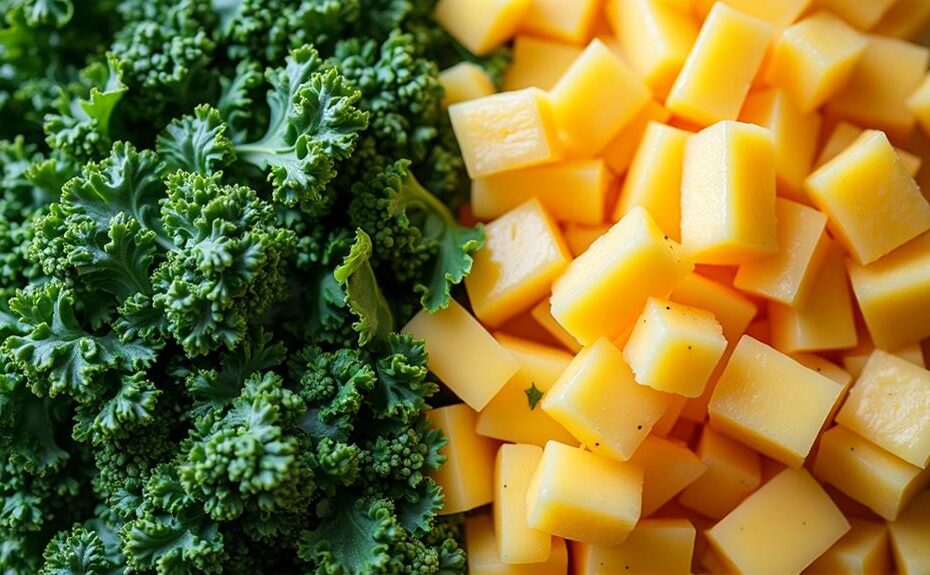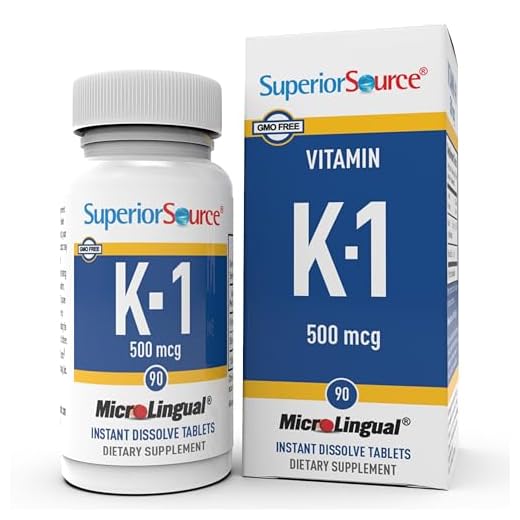





Vitamin K1 and K2 differ greatly in their sources, absorption, and roles in your body. K1 is mainly found in leafy greens and is essential for blood clotting, while K2 comes from animal products and fermented foods, promoting bone health and cardiovascular function. You absorb K1 less efficiently, and it's primarily transported to the liver for coagulation, whereas K2, especially its MK-7 subtype, has a higher absorption rate and longer circulation time, reaching various tissues. Knowing the distinctions can enhance your dietary choices, and there's much more to uncover about their health benefits and dietary recommendations.
Key Takeaways
- Vitamin K1 (phylloquinone) is primarily found in leafy greens, while K2 (menaquinone) comes from animal products and fermented foods.
- K1 is crucial for blood clotting, whereas K2 supports bone health and cardiovascular function.
- K1 has a lower absorption rate (<10%) compared to K2, which is enhanced by dietary fats.
- Recommended daily intake for K1 is 90 mcg for women and 120 mcg for men, while no established intake exists for K2.
- Both forms can interfere with blood thinners, necessitating careful monitoring by individuals on anticoagulant medications.
Overview of Vitamin K
Vitamin K plays an essential role in your health, consisting mainly of two forms: K1 (phylloquinone) and K2 (menaquinone). Vitamin K1 is chiefly found in leafy greens and accounts for 75-90% of your vitamin K intake. It's vital for blood clotting, facilitating the process of coagulation, and ensuring proper hemostasis. Leafy greens like spinach and kale are excellent sources of Vitamin K1, which may enhance nutrient absorption through light cooking methods such as steaming or sautéing with healthy fats like olive oil dietary sources of Vitamin K1. However, its absorption from plant sources is relatively low, estimated at less than 10%.
On the other hand, Vitamin K2, which you can obtain from animal products and fermented foods, has a higher absorption rate, aided by dietary fats. This form circulates longer in your bloodstream, allowing it to activate proteins that support bone health and cardiovascular function. While K1 mainly aids in coagulation, K2 is linked to various health benefits beyond clotting, including bone mineralization and reducing arterial calcification.
Sources of Vitamin K1 and K2
Leafy greens serve as the primary source of K1, with kale, spinach, and collard greens offering impressive amounts of this nutrient. For instance, a cooked cup of kale can provide about 1,062 mcg of Vitamin K1. This vitamin accounts for 75-90% of total vitamin K intake in humans, mainly derived from dietary sources like these green vegetables. Additionally, Vitamin K1 is vital for blood clotting and may contribute to overall health by supporting multiple bodily systems, making it important for those with inadequate dietary intake or malabsorption issues the role of Vitamin K in health.
On the other hand, Vitamin K2, or menaquinone, is sourced chiefly from animal products and fermented foods. One of the richest sources of K2 is natto, a fermented soybean dish, which contains approximately 1,062 mcg of MK-7 per 100 grams. Other dietary sources of K2 include hard cheeses, chicken, egg yolks, and butter.
While K1 is mainly found in leafy green vegetables, K2's availability is linked to fermented foods and specific animal products. It's important to recognize that K2 is also synthesized by gut bacteria, contributing to your overall intake, although it's less commonly consumed in typical diets. Understanding these sources is vital for ensuring you get the right balance of Vitamin K in your nutrition.
Absorption and Metabolism Differences
Understanding the differences in absorption and metabolism between K1 and K2 is crucial for optimizing your nutritional intake. Vitamin K1, primarily found in plant sources, has a low absorption rate of less than 10%. In contrast, K2, being fat-soluble, benefits from dietary fats, resulting in higher absorption and bioavailability. Doctor's Best Vitamin K2 is a great example of a supplement that enhances these advantages. K1 is mainly transported to the liver post-absorption, where it plays a critical role in blood coagulation by activating specific liver proteins.
On the other hand, K2 has a longer circulation time in the bloodstream, allowing it to reach various tissues throughout your body more effectively. This includes essential roles in regulating calcium metabolism in bones and arteries. Remarkably, the subtype MK-7 of K2 demonstrates considerably higher bioavailability, with postprandial serum concentrations being tenfold greater than those of K1.
This distinction in absorption and metabolism not only influences how these vitamins function but also impacts your overall health. Understanding these differences can help you make more informed dietary choices, enhancing your body's ability to utilize these crucial nutrients effectively.
Health Benefits of Vitamin K1
Often overlooked, vitamin K1 (phylloquinone) plays an essential role in your body's ability to maintain proper blood coagulation. Primarily found in green leafy vegetables, K1 is critical for activating proteins necessary for synthesizing clotting factors in the liver. This activation helps prevent excessive bleeding, making K1 an essential nutrient for blood clotting.
The recommended dietary intake for vitamin K1 is 90 mcg for women and 120 mcg for men, easily achievable with a diet rich in leafy greens like kale, which provides about 1,062 mcg of K1 per cooked cup. While vitamin K2 has a broader range of health benefits, the health benefits of vitamin K1 primarily revolve around its role in preventing bleeding disorders.
Moreover, research indicates a higher dietary intake of vitamin K1 is associated with a lower risk of heart disease, underscoring its significance for cardiovascular health. In the ongoing discussion of vitamin K1 vs vitamin K2, it's essential to recognize how K1 contributes to your overall well-being, particularly in maintaining ideal blood clotting and promoting heart health. By incorporating sufficient K1 into your diet, you bolster your defenses against bleeding complications and support your cardiovascular system.
Health Benefits of Vitamin K2
While vitamin K1 is primarily recognized for its role in blood coagulation and cardiovascular health, vitamin K2 has gained attention for its diverse health benefits, particularly concerning bone and heart health. One of the key vitamin K2 benefits is its ability to activate osteocalcin, a protein essential for binding calcium. This process is vital for maintaining bone health, enhancing bone density, and reducing fracture risk, especially for those with osteoporosis.
Research indicates that a daily intake of 32 micrograms of vitamin K2 may lead to a 50% reduction in the risk of heart disease by preventing calcium accumulation in arteries. By activating proteins that inhibit this accumulation, vitamin K2 supports arterial flexibility and overall cardiovascular health.
Moreover, emerging studies suggest that vitamin K2 may regulate inflammation and promote immune health, although further research is needed to fully understand these effects. This multifaceted role in both bone and cardiovascular health highlights the importance of incorporating vitamin K2 into your diet, especially if you're concerned about conditions like heart disease and osteoporosis. Understanding these health benefits can empower you to make informed choices for your overall well-being.
Dietary Recommendations for Vitamin K
Incorporating adequate amounts of vitamin K into your diet is essential for maintaining ideal health. The recommended daily intake for vitamin K1 is about 90 mcg for women and 120 mcg for men, mainly achievable through dietary sources like leafy greens, such as spinach and kale. While there's no established recommended daily intake for vitamin K2, it's beneficial to include a variety of K2-rich foods like natto, cheese, and egg yolks for optimal health.
Dietary sources of vitamin K1 are primarily plant-based, whereas vitamin K2 is largely found in animal products and fermented foods. To enhance the absorption of vitamin K, it's advisable to consume these vitamin-rich foods alongside healthy fats. This combination not only improves nutrient uptake but also supports overall health.
If you're on blood-thinning medications, it's vital to consult your healthcare provider before increasing your vitamin K intake, as it may interfere with your treatment. By being mindful of your dietary choices and including both K1 and K2 sources, you can effectively support your health and well-being.
Potential Risks and Considerations
When considering vitamin K intake, it's important to be aware of potential risks and individual health circumstances. Both vitamin K1 and K2 are fat-soluble, which means absorption can be influenced by your dietary fat intake. If you have fat malabsorption issues, you might not absorb vitamin K2 effectively, which could affect your overall health.
If you're on blood thinners, caution is significant. Both vitamin K1 and K2 can interfere with these medications, impacting coagulation and potentially leading to serious complications. Always consult your healthcare provider before making changes to your vitamin K intake.
Moreover, high doses of vitamin K2 supplements may pose unknown risks, as there's no established maximum safe dose. This uncertainty requires careful monitoring, especially for individuals with specific medical conditions, such as liver disease. In these cases, vitamin K plays an important role in calcium metabolism and coagulation, making it critical to manage intake properly.
Lastly, be wary of synthetic vitamin K3, which has been linked to liver toxicity and oxidative damage, making it a less safe choice compared to natural sources of K1 and K2. Always prioritize safety and informed choices regarding vitamin K.
Conclusion
In conclusion, while vitamin K1 and K2 both play essential roles in your health, they differ markedly in sources, absorption, and benefits. Think of them as the dynamic duo of vitamins—K1 is the leafy green powerhouse, while K2 is the bone-building champion. Ensuring you get a balance of both can support your overall well-being, so consider your dietary choices carefully. After all, your health is worth its weight in gold!





